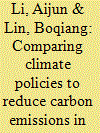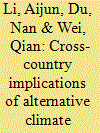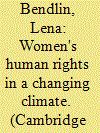|
|
|
Sort Order |
|
|
|
Items / Page
|
|
|
|
|
|
|
| Srl | Item |
| 1 |
ID:
094299


|
|
|
|
|
| Publication |
2010.
|
| Summary/Abstract |
The aim of this article is to analyze the potential for synergies between climate policies and development in a case study on India focusing on the power sector sub-optimalities. To do so, we use Imaclim-R, a dynamic recursive energy-economy model that represents a second best world with market imperfections and short-run adjustments constraints along a long-term growth path. The analysis suggests (i) global carbon pricing induces prohibitive macroeconomic costs for the Indian economy, even in the case of significant financial transfers associated with a global cap-and-trade system and a 'Contraction and Convergence in 2100' allocation scheme and (ii) the most cost efficient climate policies are not uniform carbon pricing only. The implementation of domestic policies suited to the national context, for instance targeting sub-optimalities in the power sector for India, allows reducing significantly the macroeconomic costs induced by international mitigation policies.
|
|
|
|
|
|
|
|
|
|
|
|
|
|
|
|
| 2 |
ID:
124506


|
|
|
|
|
| Publication |
2013.
|
| Summary/Abstract |
Currently, China is the largest carbon emitter mainly due to growing consumption of fossil fuels. In 2009, the Chinese government committed itself to reducing domestic carbon emissions per unit of GDP by 40-45% by 2020 compared to 2005 levels. Therefore, it is a top priority for the Chinese government to adopt efficient policy instruments to reduce its carbon intensity. Against this background, this paper develops a general equilibrium model and seeks to provide empirical contributions by comparing the potential impacts of several different policy options to reduce China's carbon emissions. The main findings are as follows. Firstly, these climate policies would affect the structure of economy and contribute to carbon emissions reduction and carbon intensity reduction. Secondly, there would be significant differences in the economic and environmental effects among different climate policies and hence, the government would trade-off among different economic objectives to overcome any potential resistances. Thirdly, there would be considerable differences in the emissions effects of absolute and intensity-based carbon emissions controls, implying that the government might adopt different climate policies for absolute or intensity-based carbon emissions controls. Looking ahead, the government should trade-off among different objectives when designing climate reforms.
|
|
|
|
|
|
|
|
|
|
|
|
|
|
|
|
| 3 |
ID:
132607


|
|
|
|
|
| Publication |
2014.
|
| Summary/Abstract |
Because of worldwide growing concerns about global climate change, great interest has been expressed in the potential of alternative climate policies to reduce global carbon emissions. In this paper, we compare cross-country implications of alternative climate policies, including unilateral and multilateral climate policies. Our main findings are as follows. Firstly, there are large differences in cross-country effects of alternative unilateral climate policies, when the same given carbon emission reductions are achieved in each abating country respectively. Meanwhile, cross-border externalities undermine efficiency of unilateral climate policies. Secondly, there are significant differences in cross-country implications of alternative multilateral climate policies, when the same global emission reductions are allocated in several different ways among abating countries. Thirdly, it is difficult to reach a stable global climate treaty, since any abating country has the incentive to argue for small carbon emission reductions. Finally, multilateral climate policies can reduce the negative impacts of cross-border externalities, but cannot cure all cross-border externalities. Looking ahead, it will be a great policy challenge for the world to reduce carbon emissions in a cost-effective way.
|
|
|
|
|
|
|
|
|
|
|
|
|
|
|
|
| 4 |
ID:
137690


|
|
|
|
|
| Summary/Abstract |
This article considers the usefulness of low-carbon scenarios in public decision-making. They may be useful as a product-oriented trajectory. The scenarios on the agenda of the 2013 Energy Debate in France belong to this category. But a scenario may also be process-oriented, in the sense that its scripting process helps build consensus and a minimum level of agreement. We have scripted scenarios using a codevelopment method, involving about 40 stakeholders from the private and public sectors, and from the state: NGOs, consumer groups, trade unions, banks and local authorities. They selected policies they considered acceptable for achieving 75% greenhouse gases emission reductions in 2050. These policies were then integrated in the Imaclim-R-France technico-economic simulation model, as part of a high or moderate acceptability scenario. In the first case emissions were cut by between 58% and 72% by 2050; in the second case by between 68% and 81%, depending on the energy price assumptions. All these measures benefited jobs and economic growth, swiftly and durably cutting household spending on energy services. This offers a solid basis for gaining acceptability for low carbon trajectories; the process constitutes also a framework for consolidating collective learning centering on the acceptability of climate policies.
|
|
|
|
|
|
|
|
|
|
|
|
|
|
|
|
| 5 |
ID:
137150


|
|
|
|
|
| Summary/Abstract |
A women's rights perspective can inform and structure research on climate policy impacts on women. To date, climate policy analysis has mostly considered women as agents of climate protection, that is, objects of mitigation policies, rather than subjects in their own right. However, climate change mitigation involves direct and indirect distributive effects depending on which sectors are involved, which instruments are chosen and how funds are obtained and allocated. Since gender roles impact on individual livelihoods and activities, distributive effects are likely to be gendered. This paper suggests that women's human rights can be used as a framework for research aiming to fill this gap. They provide a well-developed, tested range of criteria for gender justice. Such assessments would allow for a more systematic and comprehensive understanding of the gendered distributive effects of climate policies, notably with regard to the particularly understudied situation in the industrialized world.
|
|
|
|
|
|
|
|
|
|
|
|
|
|
|
|
|
|
|
|
|